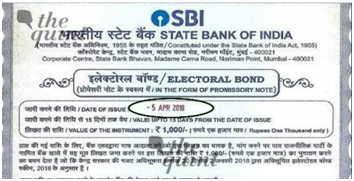Electoral bonds: SCquestions the transparency of the process
Context
Recently, the Supreme Court Justice B R Gavai, heading a Bench, asked the government whether the electoral bonds' system reveals the source of money pumped in to fund political parties.
About
What are Electoral Bonds?
- Introduced: 2018
- Electoral bonds are an instrument through which anyone can donate money to political parties.
- Such bonds, which are sold in multiples of Rs.1, 000, Rs.10, 000, Rs.1 lakh, Rs.10 lakh, and Rs.1 crore, can be bought from authorised branches of the State Bank of India.
- Objective: to bring about transparency in electoral funding in India.
- Process of Donation:
- As such, a donor is required to pay the amount — say Rs.10 lakh — via a cheque or a digital mechanism (cash is not allowed) to the authorised SBI branch.
- The donor can then give this bond (just one, if the denomination chosen is Rs.10 lakh, or 10, if the denomination is Rs.1 lakh) to the party or parties of their choice.

How Political Parties can use these donations?
- The political parties can choose to encash such bonds within 15 days of receiving them and fund their electoral expenses.
- On the face of it, the process ensures that the name of the donor remains anonymous. The source of the donations is hence not revealed to voters.
Why they attract Criticism?
- Contradicting its Basic Idea: The scheme does the exact opposite of what it was meant to do i.e. to bring transparency to election funding.
- Possibility of Extortion: The fact that such bonds are sold via a government-owned bank (SBI) leaves the door open for the government to know exactly who is funding its opponents.
- A Blow to Democracy: Political parties are exempted from disclosing donations received through electoral bonds.
- Against Free & Fair Elections: Electoral bonds provide no details to the citizens.
Supreme Courts’ Stand:
- The Indian Supreme Court has long held that the “right to know”, especially in the context of elections, is an integral part of the right to freedom of expression (Article 19) under the Indian Constitution.
- However, the Representation of the Peoples Act, 1951 does not contain any provisions for revealing the source of funding to the voters.




